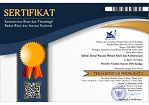In search of Islamic view of justice on women testimony
Abstract
interpretation on gender equality on position men and women. Among long crucial debate related to
the issue is position of men and women in testimony, when the place of two women witnesses which
are conceived equal to one man. It seems an ambivalent takes place regarding Islamic religious interpretation
when many verses mentioned in the Quran and some hadiths have declared explicitly the same
shared opportunity and capacity as well as mutual relation between men and women as vicegerents
(khalifah) of God on the earth, meanwhile in the practice which inherited over centuries demonstrated
inequality of men and women. This contrast, however, ultimately indicates a tension between Islam
that ethically egalitarian and historically determined. This article tries to seek an Islamic view of justice on
women testimony by arguing the importance of contextualizing interpretation by revitalizing appropriate
maxim of Quran exegetes and up grading maqasid studies in order to find a more equal and just
religious interpretation on women in Islam.
Keywords
Full Text:
PDFReferences
Al-’Alwani, Taha J., “The Testimony of Women in Islamic Law”, The American Journal of
Islamic Social Sciences, 13/2, 1996.
‘al-‘Arabiy, Abu Bakar Muhammad bin Abdillah Ibn. Ahkamul Quran. Beirut: Dâr al-Kutub
al-‘Ilmiyyah, n.a.
Al-Duwaylibî, Muhammad Ma’ruf. al-Madkhal ila ‘Ilm Usul Fiqh. Cairo: Dâr Shawwaf li al-
Nashr wa al Tawzi’, 1995.
El Fadl, Khaled Abou. Speaking in God’s Name – Islamic Law, Authority and Women. Oxford:
Oneworld Oxford, 2003.
Fadel, Mohammad, “Two Women, One Man: Knowledge, Power, and Gender in Medieval
Sunni Legal Thought”, International Journal of Middle East Studies, 29/2, 1997.
Al-Ghazali, Muhammad. Qadaya al-Mar’ah bayn al-Taqâlid al-Rakidah wa al-Wafidah. Cairo:
Dar el-Shuruq, n.a.
Al-Razi, Fakhr al-Din. Mafatihul Ghayb. Beirut: Dar al-Fikr, 1981.
‘Ashur, Muhammad Al-Thahir Ibn. Tafsir al-Tahrir wa al-Tanwir. Tunisia: Dar Tunisiah li al-
Nashr, 1984.
Mernissi, Fatima. The Veil and the Male Elite. New York: Addison-Wesley, 1987.
Mubarrak, Husni. Fiqh Islam dan Problematika Kontemporer. Banda Aceh: NASA & Ar-Raniry
Press, 2012.
Pickthall, Marmaduke. The Meaning of the Glorious Quran. N.p.: n.pub., 1930.
Qamman, Manna’. Mabahits fi ‘Ulum al-Qur’an. Cairo: Maktabah Wahbah, 2000.
Qumb, Sayyid. Fi ‘ilal al-Qur’an. Cairo: Dar el-Shuruq, 2003.
Raisuni, Ahmad. Muhadarah fi Maqasid Shari’ah. Cairo: Dar al-Kalimah, 2014.
Ridha, Muhammad Rasyid. Tafsir al-Manar. Cairo: Dar al-Manar, 1367 AH.
Wadud-Muhsin, Amina. Quran and Woman. Kuala Lumpur: Penerbit Fajar Bakti Sdn. Bhd.,
Zamakhsyari. Tafsir al-Kashshaf ‘an Haqa’iq Tanzil wa ‘Uyun al-Aqawil fi Wujuh al-Ta’wil. Beirut:
Dâr el-Ma’rifah, 2009.
DOI: https://doi.org/10.18326/ijtihad.v16i2.281-296
Refbacks
- There are currently no refbacks.

This work is licensed under a Creative Commons Attribution-ShareAlike 4.0 International License.
Ijtihad: Jurnal Wacana Hukum Islam dan Kemanusiaan by http://ijtihad.iainsalatiga.ac.id/ is licensed under a Creative Commons Attribution-ShareAlike 4.0 International License







